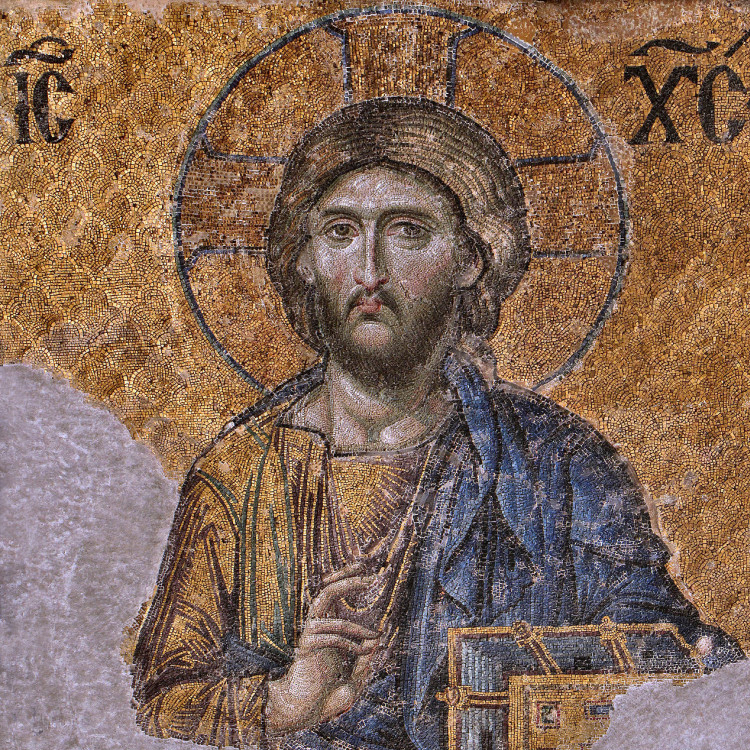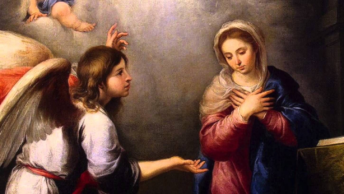If Jesus were physically alive on earth today, do you think He would be a neat and orderly person? I think so, in part because it’s just not possible for me to imagine Him being sloppy and disorganized. There’s actually a Scripture verse suggesting He was very neat and precise: John chapter 20, verse 7, which describes the empty tomb discovered first by Mary Magdalene, and then by Peter and John, early on Easter Sunday. The body of Jesus had been wrapped in a shroud, but a separate cloth—sometimes called a napkin—had covered His head. This cloth wasn’t thrown aside like the burial shroud, but was neatly rolled up or folded and put in a different place, near the entrance to the tomb. Yes, this suggests the Risen Jesus was neat and orderly, but there’s also a deeper significance. In ancient Israel, when a servant prepared dinner for his master, he waited just out of sight while the master dined. Dinner was a very important event in daily life, and it could take a long time and include interruptions. When the master was finished eating, he would rise from the table, wipe his mouth and fingers with the napkin, and carelessly toss it on the table; this signaled he was done eating, and the servant would know to come in and begin cleaning up. If, however, the master carefully folded up the napkin and laid it beside his plate, the servant wouldn’t dare touch anything; he would continue to wait in readiness, because the folded napkin was a signal from the master saying “I’m coming back” (homily notebook, “Eschatology”). This was the hidden message of reassurance or promise Jesus left for His followers on Easter Sunday. At a time unknown to us, the Lord is indeed “coming back”—and it’s our duty to be ready.
As we approach the end of the calendar year, and particularly the end of the liturgical year, the Church makes a point of reminding us that one day our world will come to an end—a truth that is very good news for some, and very bad news for others. The Book of the Prophet Daniel (12:1-3) describes what will happen: “those who sleep in the dust of the earth shall awake; some shall live forever, [but] others shall be an everlasting horror and disgrace.” The end of the world will be followed by the Last Judgment, and every single person who has ever lived will, on the basis of his or her acceptance or rejection of God’s grace, enter into an eternity of joy in Heaven, or of everlasting damnation in hell. The Letter to the Hebrews (10:11-14, 18) speaks of Jesus as the perfect high priest Whose sacrifice can save us from our sins—but only if we humbly submit ourselves to His will. An essential part of this submission involves being ready for our encounter with Him, whether it occurs at the moment of our death or at the end of the world. Our Lord assures us in the Gospel of Mark (13:24-32) that the day will finally come when He returns in great power and glory, sending out His angels to gather His elect from across the earth. We urgently need and want to be part of this favored group—but the only way we’ll be able to acknowledge Jesus as our Lord on Judgment Day is by letting Him be the Lord of our lives here and now.
Many years ago someone noticed a stone-cutter patiently chiseling away at a stone that was going to be part of an important office building. The onlooker asked, “In just what part of the building will this stone go?” The worker answered, “I don’t know; I haven’t seen the plans,” as he continued chiseling away with patience and skill (Msgr. Arthur Tonne, Stories for Sermons, Vol. 8, #291). Many times being a disciple of Jesus means faithfully fulfilling our duties, even when we don’t see how our humble efforts fit into the big picture. The Lord doesn’t ask us to understand, but He does ask us to obey in a spirit of trust, using the opportunities we’re given to serve others in His Name.
As the folded-up napkin in the empty tomb reminds us, Jesus is coming back one day. Will we be ready to meet Him when He does? How would we prefer to encounter Him—while sitting back and taking it easy, or while being active in His Name? Is He truly the Lord of our lives, or are we merely giving lip-service to the idea of Christian discipleship? These are important questions for us to consider, especially as the end of the year draws near. As the old Baltimore Catechism taught some of us, God made us to know, love, and serve Him in this world, so as to be happy with Him forever in the next. This is the Lord’s plan—but it’s up to us as to whether and how it will be fulfilled.








